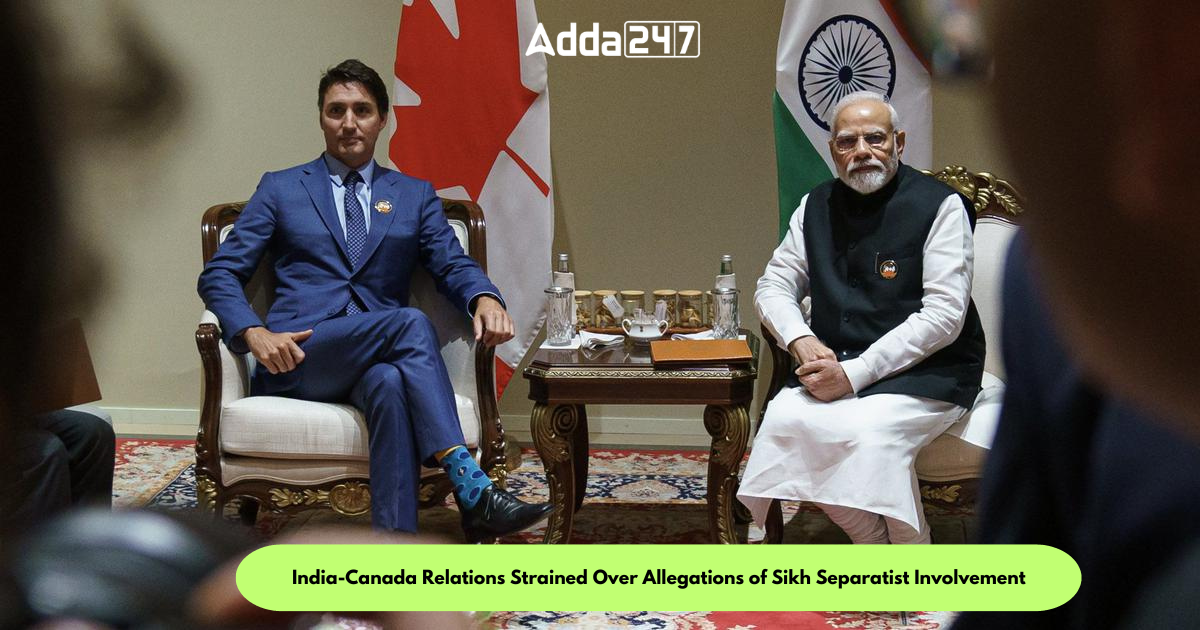Canada’s prime minister, Justin Trudeau, announced that there was “credible” information linking Indian government agents to the murder of a Sikh separatist leader in British Columbia. The announcement marks a significant worsening of bilateral ties.
Background
In the 1980s and early 1990s, Punjab, India, experienced a violent Khalistan separatist movement, resulting in the loss of thousands of lives. Today, the most outspoken supporters of this movement are mainly found among Punjabi expatriates living abroad.
Recently, there was a tragic incident where Hardeep Singh Nijjar was fatally shot outside a Sikh temple in Surrey, British Columbia, Canada. Nijjar had been advocating for the creation of an independent Sikh nation called Khalistan within India’s Punjab state. He was wanted by Indian authorities and was officially labeled as a “terrorist” in July 2020. Nijjar held a prominent position as the leader of the Khalistan Tiger Force, an organization that India has designated as a terrorist group.
This incident has given rise to discussions on social media regarding potential connections between Indian intelligence agencies and these overseas deaths, including those that occurred on Canadian soil.
India pays special attention to Canada’s Sikh community for a few key reasons:
Large Indian-Origin Population in Canada: Canada is home to a significant number of people of Indian origin, totaling around 1.4 million in a country with a total population of 40 million. Among them, about 770,000 identify as Sikhs based on the 2021 census.
- Highest Sikh Population Outside Punjab: Canada hosts the largest Sikh population outside of India’s Punjab state.
- Concerns About Sikh Extremism: India has expressed concerns to the Canadian government regarding the activities of Sikh hardliners within the Indian diaspora in Canada. India believes that some of these individuals are involved in efforts to rekindle insurgent movements.
- Historical Events Impacting Relations: Past events, such as the 1985 bombing of an Air India aircraft by a Canada-based Khalistani separatist group, have strained relations between India and Canada. These incidents have contributed to India’s vigilance regarding Sikh-related activities in Canada.
The relationship between India and Canada has significantly worsened in recent times due to various factors
Soft Approach Towards Khalistani Supporters: The Canadian government is perceived as being lenient towards individuals who support the Khalistani movement, which advocates for Sikh separatism in India. This approach is seen as detrimental to Indian interests.
Concerns About Vandalism of Hindu Temples: Indian diplomacy has consistently raised concerns about the alleged vandalization and defacement of Hindu temples in Canada by groups associated with Khalistani ideologies. These incidents have strained relations between the two nations.
Freedom Given to Khalistani Leaders: Canadian authorities have been criticized for allowing Khalistani leaders and organizations to operate with relative freedom. This includes permitting them to organize referendums advocating for the creation of an independent Sikh state within India.
Incitement of Violence Against Indian Diplomats: Khalistan elements have been involved in inciting violence against Indian diplomats. This includes displaying the photographs and personal information of Indian officials on posters, as well as targeting Indian diplomatic facilities on multiple occasions in recent years. These actions have further exacerbated diplomatic tensions between India and Canada.
Khalistan factor in Canadian politics
Canada is home to the world’s second-largest Sikh population, trailing only behind India. Sikhs make up more than 2 percent of Canada’s total population, totaling nearly 800,000 people. They are also the fourth-largest religious community in Canada and are known for their rapid growth and economic prosperity within the country.
- Canada has witnessed various waves of Sikh migration over the years, leading to the development of a thriving and economically successful Sikh community. However, it’s essential to note that in the 1980s, Canada provided refuge to several individuals who were considered terrorists, including figures like Jagjit Singh Chauhan and Talwinder Singh Parmar.
- At present, there are individuals labeled as “designated terrorists,” such as Arshdeep Singh Gill, also known as Arsh Dalla, associated with the Khalistan Tiger Force (KTF), who are residing in Canada.
- The dynamics surrounding Canada’s actions have evolved. While during the 1980s, their decisions may have been influenced by the Cold War context, today, these actions appear to be shaped primarily by domestic political considerations, specifically vote bank politics.
- In the 2019 Canadian federal election, Prime Minister Justin Trudeau’s Liberal Party fell short of a majority with 157 votes. Consequently, they formed a coalition government with the ‘New Democratic Party,’ led by Jagmeet Singh Dhaliwal, who is known to have pro-Khalistan leanings. This political alliance places pressure on the Trudeau-led government not to antagonize their coalition partners, which impacts Canada’s stance on Khalistani issues.
What does this mean for Canada-India relations?
India and Canada, which were on track to potentially reach an agreement on the framework of a trade deal by the end of 2023, have now suspended their discussions on the agreement. While Canada has provided limited details regarding this development, India has attributed it to “certain political developments.”
India stands as Canada’s tenth-largest trading partner, and the prospects for a trade deal have been in the works for more than a decade. However, in 2022, the total bilateral trade between the two nations amounted to just C$13.7 billion out of Canada’s overall trade worth C$1.52 trillion, as reported by Statistics Canada.
Following the rejection of the allegations made against them, the Indian government has called upon Prime Minister Justin Trudeau to take action against what they term as “anti-India elements” operating within Canada. India has taken further steps by expelling a senior Canadian diplomat from the country. This decision underscores the growing concern within the Indian government about Canadian diplomats interfering in India’s internal affairs and their alleged involvement in activities against India’s interests.
Efforts to mend and reset India-Canada relations in recent years have faced challenges due to Canada’s persistent stance that the actions of pro-Khalistan elements fall under the umbrella of freedom of expression guaranteed to Canadian citizens, which has been a source of friction between the two countries.
Concluding Remarks
The Indian government has strongly expressed its concerns about Khalistani activities to the highest authorities in the countries where these activities are taking place. India has engaged in constructive dialogues with Western governments, and while some progress has been made, more efforts are needed.
As Khalistani elements intensify their activities abroad, often with host countries turning a blind eye, India must redouble its efforts to prevent the recurrence of such incidents. It is crucial for India to effectively convey to these host countries that maintaining positive relations with India should not coincide with allowing anti-India separatist movements to operate within their borders.
Simultaneously, India needs to establish a constructive and sustained relationship with the Sikh diaspora. This engagement should focus on dispelling the misinformation spread by Khalistani separatists and highlighting the prevailing sense of contentment in Punjab, India’s Sikh-majority state. Building trust and understanding within the Sikh community is essential for fostering unity and countering separatist narratives.
Important takeaways for all competitive exams:
- Canada Prime Minister: Justin Trudeau;
- Canada Capital: Ottawa Currency: Canadian Dollar (CAD);
- Canada Official Languages: English and French;
- Canada Population: Approximately 38 million;
- Canada Area: 9.98 million square kilometers;
- Canada Government: Parliamentary Democracy and Constitutional Monarchy;
- Canada National Symbol: Maple Leaf.
Find More International News Here




 Scotland Legalises Water Cremation: Firs...
Scotland Legalises Water Cremation: Firs...
 National Safety Day 2026: Why March 4 Ma...
National Safety Day 2026: Why March 4 Ma...
 World Obesity Day 2026: 8 Billion Reason...
World Obesity Day 2026: 8 Billion Reason...








